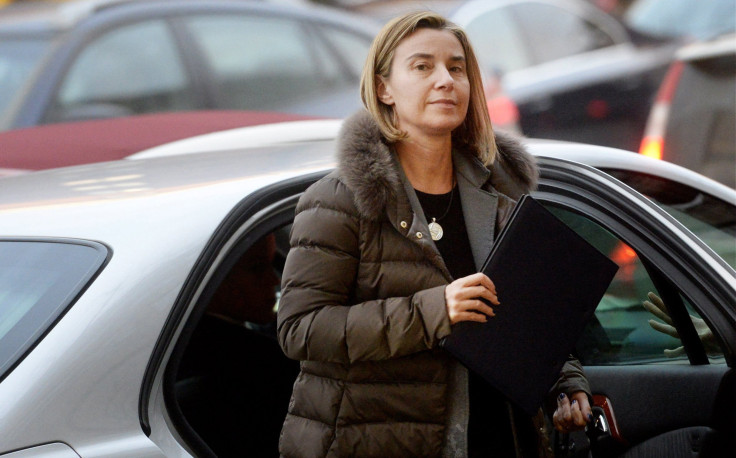Ukraine Ceasefire Monitoring Mission Must Be Expanded, More Sanctions Ready For Violations, EU Says

The European Union’s priority in Ukraine is to strengthen the ceasefire monitoring mission there, the bloc’s foreign minister, Federica Mogherini, said Friday. If fighting picks up again, she said the EU is ready to place more economic sanctions on Russian businesses and politicians.
The Organization for Security and Cooperation in Europe (OSCE) operates the primary monitoring mission in Ukraine. Around 450 staff members are part of the group’s Special Monitoring Mission to Ukraine, which has been operating in the country since March 21, 2014, at the request of the Ukrainian government.
“So far the ceasefire has been starting, not perfect with some violations still, but for sure the trend is a positive one,” said Mogherini, according to Reuters. “We need … to strengthen the OSCE mission that is on the ground now.”
Mogherini was speaking in Latvia, a state formerly under communist rule that has played a leading role in criticizing Russia and pushing for more sanctions in Europe. Senior European and U.S. diplomats have stated since the ceasefire was established in mid-February that they were prepared to step up sanctions on Russia if pro-Russian rebels broke the ceasefire.
The ceasefire appeared to be a complete failure in its first week, as fighting raged around eastern Ukraine, but since then it has generally held. Sporadic shelling and isolated fighting continues, but the brutality seen in the weeks leading up to the ceasefire has faded. Both the Ukrainian military and what the West calls separatists backed by the Russian military, are supposed to pull back the heavy weaponry that has accounted for a majority of the 6,000 or so deaths since last April, but both sides have shown hesitation. The break in the fighting has prompted thousands of eastern Ukrainians to return to the country from refuge across the border in Russia, the OSCE said Thursday.
The OSCE’s monitoring teams report around-the-clock on the situation as they see it on the ground around the country, including in war zones. The mission’s primary task now is to monitor the fragile ceasefire in Donetsk and Luhansk. Leaders of Germany, France, Russia and Ukraine agreed they thought the OSCE should expand its operations to ensure it can monitor the ceasefire.
Three rounds of sanctions by Europe and the U.S. have helped push Russia into an economic crisis over the last year. Both have frozen Russian financial assets in their jurisdictions and placed embargoes on certain imports. EU leaders are far more hesitant to expand sanctions than their American counterparts, as the bloc’s close economic ties and reliance on Russian energy have hurt its own economy.
© Copyright IBTimes 2025. All rights reserved.





















